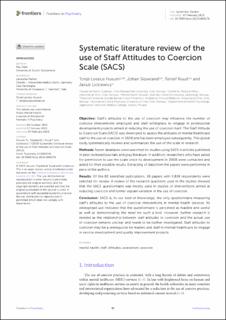| dc.contributor.author | Husum, Tonje Lossius | |
| dc.contributor.author | Siqveland, Johan | |
| dc.contributor.author | Ruud, Torleif | |
| dc.contributor.author | Lickiewicz, Jakub | |
| dc.date.accessioned | 2024-01-04T07:46:25Z | |
| dc.date.available | 2024-01-04T07:46:25Z | |
| dc.date.created | 2023-06-08T09:13:15Z | |
| dc.date.issued | 2023 | |
| dc.identifier.citation | Frontiers in Psychiatry. 2023, 14 . | en_US |
| dc.identifier.issn | 1664-0640 | |
| dc.identifier.uri | https://hdl.handle.net/11250/3109682 | |
| dc.description.abstract | Objective: Staff’s attitudes to the use of coercion may influence the number of
coercive interventions employed and staff willingness to engage in professional
development projects aimed at reducing the use of coercion itself. The Staff Attitude
to Coercion Scale (SACS) was developed to assess the attitudes of mental healthcare
staff to the use of coercion in 2008 and has been employed subsequently. This global
study systematically reviews and summarizes the use of the scale in research.
Methods: Seven databases were searched for studies using SACS in articles published
in peer reviewed journals and gray literature. In addition, researchers who have asked
for permission to use the scale since its development in 2008 were contacted and
asked for their possible results. Extracting of data from the papers were performed in
pairs of the authors.
Results: Of the 82 identified publications, 26 papers with 5,838 respondents were
selected for review. A review of the research questions used in the studies showed
that the SACS questionnaire was mostly used in studies of interventions aimed at
reducing coercion and further explain variation in the use of coercion.
Conclusion: SACS is, to our best of knowledge, the only questionnaire measuring
staff’s attitudes to the use of coercive interventions in mental health services. Its
widespread use indicates that the questionnaire is perceived as feasible and useful
as well as demonstrating the need for such a tool. However, further research is
needed as the relationship between staff attitudes to coercion and the actual use
of coercion remains unclear and needs to be further investigated. Staff attitudes to
coercion may be a prerequisite for leaders and staff in mental healthcare to engage
in service development and quality improvement projects. | en_US |
| dc.language.iso | eng | en_US |
| dc.rights | Navngivelse 4.0 Internasjonal | * |
| dc.rights.uri | http://creativecommons.org/licenses/by/4.0/deed.no | * |
| dc.title | Systematic literature review of the use of Staff Attitudes to Coercion Scale (SACS) | en_US |
| dc.type | Peer reviewed | en_US |
| dc.type | Journal article | en_US |
| dc.description.version | publishedVersion | en_US |
| cristin.ispublished | true | |
| cristin.fulltext | original | |
| cristin.qualitycode | 1 | |
| dc.identifier.doi | 10.3389/fpsyt.2023.1063276 | |
| dc.identifier.cristin | 2152935 | |
| dc.source.journal | Frontiers in Psychiatry | en_US |
| dc.source.volume | 14 | en_US |
| dc.source.pagenumber | 10 | en_US |

